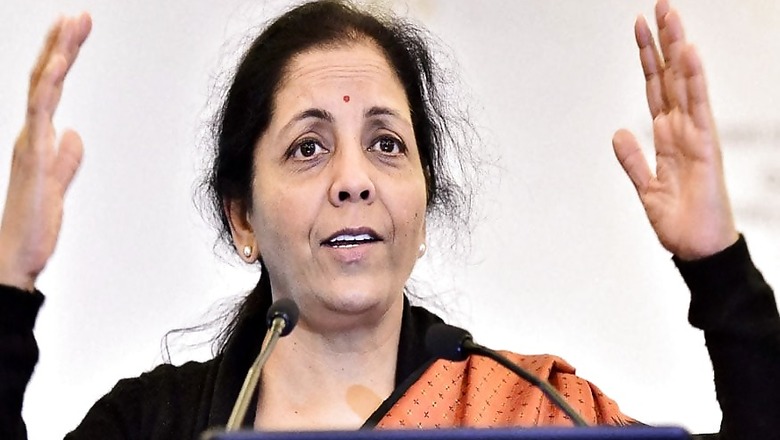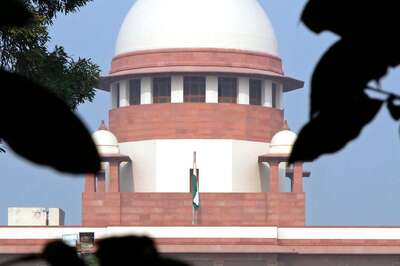
views
New Delhi: Micro, small and medium enterprises (MSMEs) form the backbone of India’s businesses and its famed entrepreneurial spirit. This sector employs nearly 11 crore Indians in over six crore enterprises; it accounts for a third of India’s GDP and more than a third of our exports. MSMEs have been passing through a hard time due to the Covid-19 pandemic since an extended nationwide lockdown has meant units have been shut for more than a month. This has meant severe shortage of working capital, labour and livelihoods. To make matters worse, the government and big business together owe these small firms nearly Rs six lakh crore, MSME minister Nitin Gadkari said recently.
Now, as the government talks of devising a package to mitigate the troubles of the MSME sector, some entrepreneurs and owners of small businesses are already a dejected lot. They are unhappy at the quantum of relief being discussed and at the sheer number of days it is taking the government to come up with any concrete revival package. Gadkari has spoken of creating a fund with a corpus of Rs one lakh crore but this must be cleared by the Ministry of Finance. As of now, there is only talk of some help for the MSMEs, no actual succor has arrived.
Congress President Sonia Gandhi has demanded a Rs two lakh crore package for the sector: a Rs one lakh crore MSME Wage Protection package plus a credit guarantee fund of another Rs one lakh crore and a 24X7 helpline for helping the sector out of this crisis. Prominent business chambers, including the Federation of Indian Chambers of Commerce and Industry (FICCI) and the Confederation of Indian Industries (CII) have also come up with suggestions on the issue.
But owners of such enterprises do not seem to be nursing hopes of any meaningful package being announced anytime soon. A senior industry representative said it was premature to talk of any relief since the government seemed to be dithering over the quantum and the timing of relief measure.
Raja Shanmugham, President of the Tirupur Exporters Association, said the very term MSME was archaic, with definitions of micro (up to Rs one crore turnover), small (up to Rs 5 crore) and medium (Rs 10 crore turnover) making little sense. The exporters of Tirupur want a relief package which is not confined to the MSME sector, arguing that all sections of the economy have been hit.
In Ludhiana, known for its small scale knitwear industry, sales have been halted during the peak summer season due to the lockdown and no payment has been received for supplies already made, though most units in the city have retained migrant labour.
Vinod Thapar, President of Knitwear and Textile Club of Ludhiana, said, “We paid them (labour) wages for a month and are now paying Rs 2,500 per month for food expenses besides supporting them in other ways. Our industry has already lost Rs 1,000 crore within one month. We have asked government to lower GST rate to 4% on raw material for at least one year. We are also seeking waiver of 12% GST on manmade fibre and 5% on natural fibre.”
Another owner of a small scale unit pointed out that raising funds had become a huge issue. “Our payments are stuck, we have not been able to buy raw material and must continue to pay salaries. The RBI has taken some steps like creating a scheme for emergency working capital requirement for banks to lend additionally but the Central bank hasn’t relaxed the provisioning norms for this lending so banks continue to hesitate to lend.”
The Federation of Small and Medium Enterprises had earlier sought deferment of loan repayments, waiver of penalties due to delay in filing returns, measures for immediate increase in liquidity and a six month moratorium on all payments by MSMEs. The federation had also sought permission for units to pay staff through ESIC contributions, permission to lay off workers and a comprehensive financial package.
Meanwhile, taking cognizance of reports that the government was mulling incentives for MSMEs amounting to nearly Rs three lakh crore, analysts at Kotak Institutional Equities said that this would be nearly 17% of the outstanding credit to the sector. Under the package, MSMEs may be able to borrow an additional 20% of their outstanding credit limit, which will be fully backed by the government. The government is also expected to set up a special fund to pay for defaults.
CII and FICCI have both flagged the severe cash crunch faced by MSMEs and exhorted the government to come up with a comprehensive credit guarantee scheme. CII has sought a credit protection scheme whereby 75-80% of the loans should be guaranteed by RBI. If the borrower defaults, RBI should buy the loan and repay the bank up to 75-80% of the loan, so the risk to the lender is limited.
FICCI has suggested that interest free and collateral free loans be given to MSME companies (which have a turnover of less than Rs 500 crore) for up to 12 months, depending on the sector, to enable them to cover fixed costs, salaries and other operational expenses; for non-GST paying companies, an alternate mechanism may be worked out (based on IT filing).
FICCI has also sought greater regulatory forbearance, including change in NPA (bad loans) definition and loan restructuring, It has also sought a deferment of all tax payments, including GST payments, for MSMEs.
While suggestions are aplenty, it remains to be seen when and how much is the government able to afford to support MSMEs. The Kotak analysts have said that at current delinquency levels, a Rs three lakh crore package will expose the government to contingent liabilities of nearly Rs 30,000 crore. “At the end of September 2018, NPA level for the ‘micro’ and ‘SME’ segments stood at 8.5% and 11.3% respectively. Assuming an aggregate NPA level of ~10% for these two categories, Rs three lakh crore fully government backed package will expose the central government to Rs 30,000 crore in contingent liabilities.”
Of course, the liability of the government would rise in case delinquencies are higher, which is a distinct possibility given the systemic stress. We are already in some danger of overshooting our fiscal deficit target for the year by a wide margin and analysts have also predicted that India’s public debt will rise substantially in 2020-21. Given these harsh realities, the government may not go in for a big bang package for MSMEs or may tweak measures to lower its own liabilities.




















Comments
0 comment